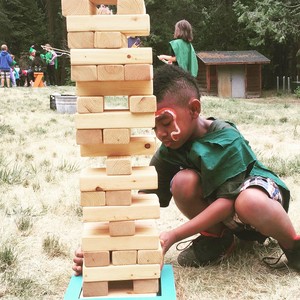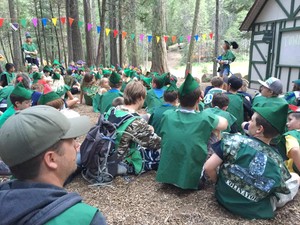Calvin Crest Executive Director Tony Biasell remembers his dark night of the soul. It was the turning point for what once was the Presbyterian Church, (U.S.A.)’s second largest summer camp.
Calvin Crest, which sits just above 5,000 feet in the Sierra Nevada mountain range on the border of Yosemite National Park, had drawn as many as 3,000 summer campers at its peak in 1997. In 2003 Biasell, already sensing a cultural shift regarding the priority of church-related camping, was sitting with a group of high school youth when one of the young women asked him a startling question.
“Is tonight cry night?” she wondered.
“What do you mean?” Biasell asked.
“You know,” she said, “the night where we always talk about heaven and hell, and making a commitment to Jesus. If it’s cry night I have to make sure I have the right makeup on.”
A stunned Biasell went to the cabin counselors who’d come with the young people from their churches and told them Calvin Crest would longer no do “the heaven and hell nights” effective immediately.
“We’re Presbyterians,” Biasell remembers thinking, “and this is what means to our young people to follow Jesus?” He says he couldn’t think of “anything more blasphemous.”
In the many sleepless nights that followed, Biasell reflected on his personal journey at Calvin Crest and how it related to the PC(USA)’s journey. He says when he started in 1992 there were already philosophical differences within the churches of the San Joaquin Valley and Sacramento presbyteries; and these divisions spilled into the camp.
He remembers church leaders and parents who said, “He talks about Jesus too much,” and those who didn’t want him talking to their kids about “the social gospel.” He felt that tension constantly, and began to see how the lack of trust between self-identified liberal and conservatives groups was impacting churches.
Because of what Biasell calls, “this in-fighting,” church membership and camp attendance began to decline.
“Many churches stopped hiring seminary-trained youth pastors,” he says, “often replacing them with part-time students [returning] from college [who had] grown up in their youth groups.”
Increasingly, Biasell felt the youth coming to Calvin Crest were being trained to become “Christianized culture consumers” rather than disciples of Jesus. He told his staff and cabin camp counselors he wanted them to teach their young people how to be followers of Jesus in hopes they would eventually become disciples of Jesus.
“At first they were ticked with me, which is my fault,” he says. “I didn’t realize they didn’t know how to lead people to become a Jesus follower, let alone a disciple. They’d never been trained in it.”

A camper plays a game of giant Jenga at Calvin Crest’s ‘Sherwood Forest’ camp experience. —Photo courtesy Calvin Crest
In 2003, Biasell also felt that if he wasn’t speaking out about homosexuality and the church he wasn’t doing his job. “But that’s where we were,” he says. “It’s how I was raised: conversion, the authority of scripture. The keynote speakers of the day were these reformed evangelicals. It’s tragic to think this was happening as we were losing churches and members.”
Even as Biasell was questioning everything Calvin Crest was doing, he was trying to create followers of Jesus by bridging what some had positioned as a division between Christianity and the social gospel. While Calvin Crest’s attendance numbers dropped from its all-time high of 3,000 to 500 by 2012, big staff changes occurred related to budget and directional shifts. Staff went through furlough, and those who remained experienced pay reductions.
Through it all Biasell spoke to churches throughout California about the vision he had. Instead of using God’s creation as a backdrop for kid’s to get “saved” and have a religious experience on “cry night,” he wanted to use it as a classroom where people could learn how to live in harmony with creation and God’s way.
“We asked churches to partner with us to create lifelong disciples of Jesus Christ,” says Biasell, “as defined by Jesus’ teachings, of bringing shalom to our neighborhoods and communities.”
The message that Calvin Crest would no longer focus on divisive cultural issues, but instead teach people—young, old and in between—how to participate in Christ’s kingdom of heaven on earth, gradually began to resonate with churches. Calvin Crest’s numbers have steadily increased and in 2015 they served nearly 1,500 summer campers.
“Please make sure people know this isn’t about numbers for me,” says Biasell. “I no longer want to be part of Christian institutions that don’t point people to the way, truth and life of Jesus. The growth we’re experiencing is because churches feel welcome again, which is what worshiping God is meant to do—bring unity. We’re learning together how to love God above all, and our neighbor as much as we love ourselves. At 5,000 feet, people, including all of our youth, are learning they matter to us, to God, and to the universe, as they discover and live out the purpose for which they were born.”

